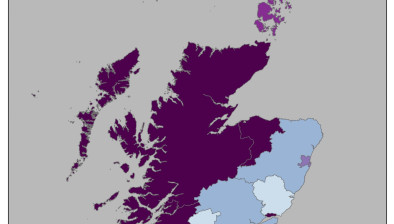Independent report recommends review of fuel poverty definition
 Expert review groups into fuel poverty have called for the definition to be reviewed to ensure help is targeted at those who need it most.
Expert review groups into fuel poverty have called for the definition to be reviewed to ensure help is targeted at those who need it most.
Two reports by the Scottish Fuel Poverty Strategic Working Group and Scottish Rural Fuel Poverty Task Force have made over 100 recommendations to address the issue of fuel poverty, all of which will now be considered in full by Ministers.
The reports were published alongside a Scottish Government research paper on the likelihood of being fuel poor in rural Scotland to help identify households with a high risk.
The existing definition of fuel poverty, drawn up 15 years ago, states it is where a household has to spend more than 10 per cent of its income, including benefits, in order to maintain a “satisfactory heating regime”. ‘Extreme fuel poverty’ means a household would have to spend more than 20 per cent of its income on energy use.
However, recent research for the Scottish Government indicates that more than half of ‘fuel poor’ households would not be classified as ‘income poor’.
In A Scotland without fuel poverty is a fairer Scotland: Four steps to achieving sustainable, affordable and attainable warmth and energy use for all, the Scottish Fuel Poverty Strategic Working Group suggests that academics could be asked to draw up a more focused definition, taking into account factors such as whether households are burdened by mortgage payments and the variation of heating needs between particular age groups.
For the Strategic Working Group, a review is both timely and warranted given the Scottish Government’s plans to develop a new fuel poverty strategy and respond to the failure to meet the statutory target to eradicate fuel poverty by November 2016.
Other ‘high level’ recommendations from the Strategic Working Group include the development of a fuel poverty strategy that:
The Scottish Rural Fuel Poverty Task Force’s An Action Plan to Deliver Affordable Warmth in Rural Scotland sets out three guiding principles to help the Scottish Government deliver its fuel poverty and energy efficiency programmes which are:
Principle 1: Fairness and social justice should be every household’s right, wherever in urban or rural Scotland they happen to live.
Principle 2: All vulnerable households should receive the most effective practical help and support they need to keep their homes warm and at a cost they can afford.
Principle 3: The progress made by Scottish Government in its strategic approaches to eliminating fuel poverty from peoples’ lives should be set within a statutory framework for delivery which is rigorously measured and held to annual account by the Scottish Parliament.
The report makes recommendations on a range of issues, including the development of personalised outreach support to address fuel poverty problems, greater support for off-gas areas, encouraging and supporting consumers to switch tariff and supplier, and more comprehensive monitoring and evaluation of the impact of fuel poverty schemes in rural Scotland.
Other recommendations from both independent reports include:
Housing minister Kevin Stewart said: “Everyone should be able to heat their home and keep themselves and their families warm, therefore tackling and eradicating fuel poverty is vital and we must make sure action we are taking is making a difference to those that need it most.
“The advice is clear that the current definition is unhelpful in ensuring support is delivered to those who need it most. That is why, I will take immediate and decisive action to take forward the recommendation on reviewing the definition of fuel poverty and set up the expert independent review called for. However I am clear that I will not define away the problem and the changes must be justified to ensure that those in need receive the most support.
“We are committed to eradicating fuel poverty. Since 2008 over one million energy efficiency measures have been installed in almost one million households across Scotland which has helped make homes warmer and easier to heat. We will build on this by investing half a billion pounds over the next four years to continue tackling fuel poverty and improving energy efficiency.
“Over 100 recommendations have been made, many of which are complex and have wider implications that must be considered alongside other policies. All of this cannot happen immediately but both reports are a good first step in informing our new fuel poverty strategy and we will respond fully in due course.”
National fuel poverty charity Energy Action Scotland has urged Scottish Ministers to reset the target to eliminate fuel poverty in Scotland.
As the Scottish Government has already said this target will not be met, the charity is now urging Ministers to use the reports to redraw the fuel poverty strategy and to reset the target date to eradicate fuel poverty.
According to the charity, the range of recommendations included in the reports each require equal and careful consideration and not just a focus on the recommendation to review underlying aspects of the fuel poverty definition.
Norman Kerr, director of Energy Action Scotland, said: “There is a wealth of information in the two reports which Ministers must now consider in order to review the fuel poverty strategy for Scotland. Having recently set out its proposals to eradicate child poverty in Scotland by a set date, the Scottish Government now must do the same for resetting the almost expired fuel poverty eradication target date and set it in statute.
“The Scottish Government, and all political parties in Scotland, acknowledge the problem of fuel poverty and must be given credit for tackling the problem and continuing to fund programmes to that end. However, to meet their ambitions to end the blight of cold, damp homes, more action must now be taken.
“People across Scotland will want to know that one day the right that everyone has to be able to live in a warm, dry home at a price they can afford will be a reality.”
The Existing Homes Alliance called on the Scottish Government to accept as a matter of urgency the recommendation that it eliminates poor building energy efficiency as a driver of fuel poverty.
In particular, the Alliance urges all parties at Holyrood to support the recommendation of the Scottish Fuel Poverty Strategic Working Group, of a milestone that ‘all properties of fuel poor households upgraded to at least an EPC band C by 2025’.
Setting and achieving this as a new objective would cut winter deaths, reduce fuel bills, promote employment across the country, help reduce emissions, and is supported in a joint statement of more than 50 organisations, the Alliance said.
Lori McElroy, chair of the Existing Homes Alliance, said: “When this target date was set for the elimination of fuel poverty, it was universally described as ambitious. For more than a decade experts have warned that a target alone was not enough, and that concerted action would be required so no-one is left in fuel poverty because of the state of their home. This earlier target has been missed because insufficient action has been taken since 2002, but today’s reports clearly show the way ahead.
“The Scottish Government has all the powers it needs to regulate and improve the quality of the homes we live in. With a consistent commitment, none of Scotland’s homes should be below the Energy Performance Certificate Band C standard by 2025.
“We are pleased to have seen renewed and strengthened commitments to energy efficiency this year, not just from the Scottish Government, but from all parties at Holyrood. The first test of those commitments will be the forthcoming Scottish Budget process. Will the money follow? Similarly, we know home insulation has been set as a national infrastructure priority: will the Band C target be incorporated there, and will the necessary regulations follow?”
Scottish Land & Estates, which represents rural businesses, farms and landowners across the country, was a member of the Rural Fuel Poverty Task Force and has welcomed the recommendations of the two reports.
Katy Dickson, senior policy officer (business, property and connectivity) at Scottish Land & Estates, said: “Those living in rural areas are often the most adversely affected by fuel poverty and there is clearly a need for government, agencies and stakeholders to work together in order to tackle this continuing problem.
“We welcome these reports as a good basis for clear action to help those struggling with fuel poverty. The Strategic Working Group states that the new fuel poverty strategy ‘must also go beyond improving energy performance of homes and put emphasis on the other three drivers of fuel poverty - income, energy costs and how energy is used in the home.’
“This, alongside, the Rural Fuel Poverty Task Force’s emphasis on ‘rural-proofing’ the strategy, ensuring people living in off-gas, older properties are not disadvantaged, are strongly supported.
“Dormont Estate in Lockerbie, one of our members, was a case study for the Strategic Working Group who witnessed what the estate has achieved for local residents through its Passivhaus development. This has been a remarkable success and whilst action needs to be taken to tackle fuel efficiency on homes which are already built, there is much to be achieved by sharing the best practice established through new housing such as that at Dormont.
“Our Helping It Happen campaign showcases a number of innovative approaches that our members are taking to addressing fuel poverty and we want to see more and more examples of this across Scotland.”























